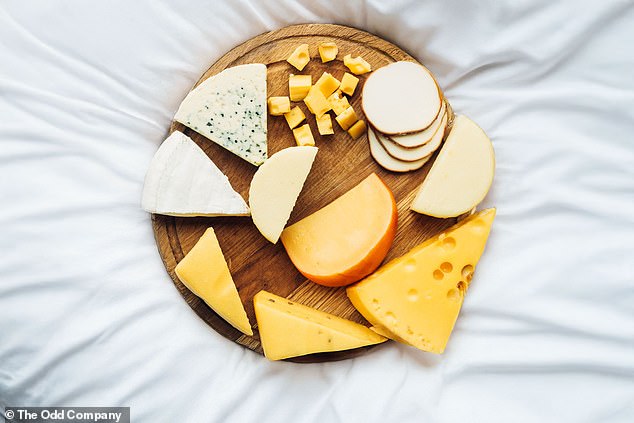[ad_1]
If the old wives’ tale is anything to be believed, those who want a peaceful nights’ sleep shouldn’t tuck into cheese and biscuits right before bed.
But is there any truth to the myth?
A study has finally settled the debate on whether cheese gives you nightmares.
And the findings might make you think twice about your late evening snack choice.
The research, carried out by luxury sleep brand The Odd Company, involved recruiting 30 participants who dined on four of the UK’s most popular cheeses – brie, cheddar, stilton and mozzarella – over four nights.
They discovered that eating 30g of cheese before bed increased the likelihood of nightmares by 93 per cent.
Participants reported that their dreams took a darker, more stressful and often frightening turn after eating cheese, the experts found.
They described vivid and often unsettling dreams that included being cheated on, bumping into an ex, being forgotten on a birthday, friends under attack from flying robots and being scolded by a teacher at a salsa class.

While a cheeseboard, like this one pictured, might look appetising, experts have discovered that eating cheese before bed increases the likelihood of nightmares by 93 per cent
The worst cheese for nightmares was found to be brie.
It triggered nightmares in 68 per cent of people who ate it, compared to 63 per cent for stilton, 56 per cent for cheddar and 40 per cent for mozzarella.
The study also revealed that consuming cheese before bed led to half of participants losing an average of one hour and seven minutes of sleep per night.
Analysis revealed women lost around five minutes more sleep, on average, than men.
Amie Alexander, a registered dietitian at Nutri Peak, said: ‘Cheese can affect the quality and quantity of sleep based on its nutritional composition.
‘It contains saturated fats and protein, which take a long time to digest and can raise body temperature.
‘If your digestive system is still working hours later after snacking on cheese at midnight, it will prevent your body from reaching deep, restorative levels of sleep.’
She explained that another route possibly linking cheese to dreams is that it contains tryptophan.

Brie was found to be the biggest trigger of nightmares, while mozzarella only led to nightmares in 40 per cent of people
This is an amino acid involved in the synthesis of serotonin and melatonin – neurotransmitters responsible for mood, sleep, and internal body clock regulation.
High levels of serotonin may influence REM (rapid eye movement) sleep, during which the most vivid dreaming occurs.
‘Cheese contains tyramine, particularly in aged cheeses like Parmesan, Gouda, and Roquefort,’ Ms Alexander added.
‘Tyramine is said to induce the release of norepinephrine, a stimulant that can increase activity in the heart and brain.
‘This could lead to more intense dreams or more awakenings during REM stages in sensitive people, with the possible subsequent remembering of unpleasant or vivid dreams.’
According to the Mayo Clinic artisan, handmade, or aged cheeses tend to be high in tyramine.
Cheddar and Stilton contain particularly high levels due to their aging processes, while Brie also ranks relatively high in tyramine content.
Mozzarella, on the other hand, is a fresh, non-aged cheese typically made from pasteurised milk, meaning it contains significantly lower levels of tyramine.

Experts said: ‘For all the cheese-lovers out there, we’d recommend enjoying your cheeseboard at least two to four hours before sleeping’ (stock image)
This might help explain why mozzarella ranks lowest for nightmares.
Commenting on the findings Andrew Seed, managing director at The Odd Company, said: ‘For all the cheese-lovers out there, we’d recommend enjoying your cheeseboard at least two to four hours before sleeping.’
A previous study, carried out by the British Cheese Board, indicated that cheese could actually aid sleep.
The research, which involved 200 volunteers in a week-long experiment, found that after eating a 20g piece of cheese 30 minutes before going to sleep, 72 per cent of the volunteers slept very well every night.
The findings showed that none of the participants reported nightmares.
Dr Judith Bryans, a nutrition scientist at The Dairy Council at the time, said: ‘One of the amino acids in cheese – tryptophan – has been shown to reduce stress and induce sleep so cheese may actually help you have a good night’s sleep.’
[ad_2]
This article was originally published by a www.dailymail.co.uk . Read the Original article here. .

